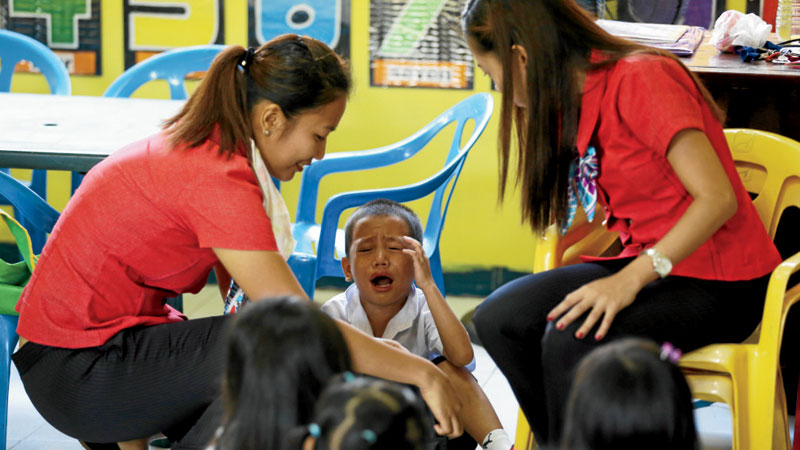
A kindergarten pupil cries at the gate of President Corazon Aquino Elementary School, Batasan Hills, Quezon City, June 13, 2016, during the opening of classes.
INQUIRER PHOTO / NINO JESUS ORBETA
IN TIME for the resumption of classes on Monday, the Department of Education (DepEd) launched a primer to help guide teachers on how to positively enforce discipline on hard-headed students.
Called the “Positive Discipline in Everyday Teaching,” the primer developed by DepEd in partnership with child rights group Save the Children and education group E-Net Philippines lists ways teachers can apply positive and non-violent discipline in the classroom.
Education Undersecretary for Legal Affairs Alberto Muyot said there was a need to develop this set of guidelines as part of DepEd’s child protection policy because “some teachers tend to handle situations regarding their students wrongly.”
Muyot cited a survey conducted by the Council for the Welfare of Children in 2009, which showed that 30 percent of public school students fall prey to corporal punishment and around 70 percent experience physical and psychological abuse at the hands of their own teachers.
Muyot said it was because of these figures that the DepEd developed in 2012 the Child Protection Policy (DepEd Order No. 40) which imposes zero-tolerance for any act of violence against children in school, including corporal punishment.
No need to use fists
“What the primer seeks to do is to address some of the problems teachers often face, without them using their fists. Students make mistakes and we need to realize that intimidating them will not make them any smarter or more confident. Authority can easily be used, but authority when abused is not right. Teachers make a big difference in the lives of the students, so they can either make or break a student,” Muyot said.
The issues discussed in the primer were divided into four parts: Corporal punishment; the positive discipline model; examples of responding with positive discipline; and a section on teachers’ well-being to support and help them cope with stress.
Among the problems usually encountered by teachers that were pointed out were crying, disruptive behavior and cutting classes.
“We recognize that teachers, administrators and staff, as stewards of learning institutions, are responsible for an enabling and supportive environment for effective learning based on the principles of positive discipline,” Education Secretary Armin Luistro said.
Solve problems with love
“Nowadays, Filipinos want our country’s problems to be solved in the blink of an eye—from traffic to corruption. We have to understand that this is a process and we cannot solve problems with a gun or with hurtful words—we solve them with love. This primer is more powerful than that, that even those who are not in the field of education will deem it helpful. All long-term changes can happen through positive discipline,” Luistro said. With a report from Evelyn Cruz